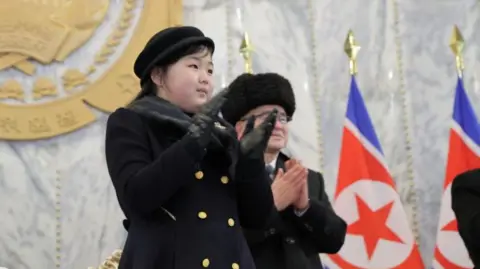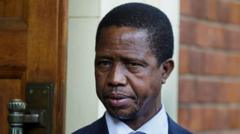In life, Pope Francis opted for simplicity, residing in a modest apartment rather than the grand Apostolic Palace, and he has adhered to this philosophy even in death, requesting a single coffin with minimal decoration for his burial. His funeral will commence this Saturday at St. Peter’s Basilica, where global leaders and cardinals will gather to pay their respects to the beloved pontiff.
As of Monday, in the wake of Francis' death, cardinals from around the world have commenced their journeys to the Vatican, gathering to not only commemorate the pontiff's life but also to prepare for the significant task ahead: electing a new leader for 1.3 billion Catholics worldwide. Cardinal Giovanni Battista Re, the dean of the College of Cardinals, called for the first meeting on Tuesday morning to discuss the upcoming rituals involved in the interment process.
Pope Francis' funeral will be characterized by his emphasis on a more simplified rite, following the modified guidelines he approved last year, which aim to reflect his values. On Wednesday, Francis’ body will be moved to St. Peter’s Basilica for public viewing before the funeral proceedings.
The challenge of finding a successor is compounded by shifting global dynamics among political and religious leaders, some of whom had contentious relationships with the late pope. A notable attendee will be President Trump, marking his first overseas trip of the term amidst the complexities that his visit may entail.
The selection of the next pope is a finely nuanced process, heavily guarded by tradition and enveloped in secrecy. Cardinals under 80 years old will participate in the voting process, convening to decide who will guide the future of the Church. Francis leaves behind a mixed legacy of progressive ideals intertwined with conservative pushbacks, reflecting both his broader mission to serve and the internal Church dynamics that could influence the direction of his successor.
Moreover, the Vatican has acknowledged the significance of Pope Francis’ health challenges leading to his death from a cerebral stroke. His commitment to addressing critical global issues, such as climate change and humanitarian crises, has defined his tenure. In mourning, many across the globe have gathered to celebrate his commitment to inclusivity and compassion, embracing his message that “everyone, absolutely everyone, fits in this Church.”
In addition to the upcoming funeral, global periods of mourning have initiated across various nations, with flags lowered in tribute and memorial services held in places like the Philippines, Venezuela, and Italy to honor the pope's significant contributions and heartwarming outreach.
As the world comes to terms with this loss, the hope is to dedicate the future of the Catholic Church to a leadership that embodies the ideals of faith, compassion, and inclusivity demonstrated by Pope Francis throughout his tenure.
As of Monday, in the wake of Francis' death, cardinals from around the world have commenced their journeys to the Vatican, gathering to not only commemorate the pontiff's life but also to prepare for the significant task ahead: electing a new leader for 1.3 billion Catholics worldwide. Cardinal Giovanni Battista Re, the dean of the College of Cardinals, called for the first meeting on Tuesday morning to discuss the upcoming rituals involved in the interment process.
Pope Francis' funeral will be characterized by his emphasis on a more simplified rite, following the modified guidelines he approved last year, which aim to reflect his values. On Wednesday, Francis’ body will be moved to St. Peter’s Basilica for public viewing before the funeral proceedings.
The challenge of finding a successor is compounded by shifting global dynamics among political and religious leaders, some of whom had contentious relationships with the late pope. A notable attendee will be President Trump, marking his first overseas trip of the term amidst the complexities that his visit may entail.
The selection of the next pope is a finely nuanced process, heavily guarded by tradition and enveloped in secrecy. Cardinals under 80 years old will participate in the voting process, convening to decide who will guide the future of the Church. Francis leaves behind a mixed legacy of progressive ideals intertwined with conservative pushbacks, reflecting both his broader mission to serve and the internal Church dynamics that could influence the direction of his successor.
Moreover, the Vatican has acknowledged the significance of Pope Francis’ health challenges leading to his death from a cerebral stroke. His commitment to addressing critical global issues, such as climate change and humanitarian crises, has defined his tenure. In mourning, many across the globe have gathered to celebrate his commitment to inclusivity and compassion, embracing his message that “everyone, absolutely everyone, fits in this Church.”
In addition to the upcoming funeral, global periods of mourning have initiated across various nations, with flags lowered in tribute and memorial services held in places like the Philippines, Venezuela, and Italy to honor the pope's significant contributions and heartwarming outreach.
As the world comes to terms with this loss, the hope is to dedicate the future of the Catholic Church to a leadership that embodies the ideals of faith, compassion, and inclusivity demonstrated by Pope Francis throughout his tenure.



















